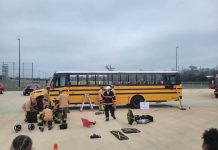KANSAS CITY, Mo. — Brooke, a 24-year-old college student, came out several years ago as a lesbian, saying that it allowed her “the freedom to be my authentic self.” In a video interview, Brooke advised school bus drivers to make an extra effort to support LGBTQ students on board, because the drivers may be the only people in the children’s live who do so.
Kathleen Furneaux, executive director of the Pupil Transportation Safety Institute and Brooke’s aunt, played the interview as part of a presentation to NASDPTS and suppliers council members on the final day of the annual conference.
Furneaux and PTSI are developing a new driver and attendant training program for the CYR Foundation, the educational arm of the New York Association for Pupil Transportation. The program focuses on protecting LGBTQ students on the bus.
Due to rejection, bullying and harassment, Furneaux said LGBTQ students face growing suicide rates. The Trevor Project, a national 24-hour, toll-free confidential suicide hotline for gay and questioning youth, reported that LGBTQ students are 2.5 times more likely to harm themselves than their straight peers. Suicide is the second leading cause of death for youth ages 10 to 24, according to the Centers for Disease Control, and of these, LGBTQ youth are four times more likely to take their own lives.
“The biggest rejection I ever felt didn’t come from anyone else, it came from myself,” Brooke said.
School bus drivers and attendants can positively effect this data and protect themselves from violating new federal discrimination laws. In May, the U.S. Department of Education expanded “sexual discrimination” in Title IX to include not only sexual preference, but also gender identity.
Furneaux said compassion and tolerance of all children should also be an expectation of driving and attending to students on the school bus
This does not mean school bus drivers and attendants should ignore their own religious and personal values, she added. Instead, she recommends an honest, individual examination of their own potential for prejudice and discrimination, and managing everyday responses and interactions with students on the bus.
“Whatever you feel, whatever your opinions are, they truly are irrelevant when it comes to transporting students on the school bus,” Furneaux said. “It must be set aside. Verbal and nonverbal responses must communicate acceptance and tolerance on the bus.”
For example, she said drivers and attendants must retain professional and respectful attitude toward all the students they transport. This means focusing on the fact that the passengers are children rather than on differences in gender identification and sexual orientation. She said she looks back at her own career as a school bus driver, and “cringes” at things she said to students that were never meant to hurt them, but very well might have.
“The focus must be respectful and safe behaviors during transport must be our focus,” she added. “You are expected to [have] role model acceptance.”


















